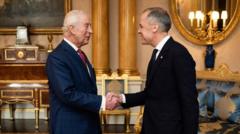In a notable turn of events, Canadian Prime Minister Mark Carney has invited King Charles III to Canada, a move highlighting the nation’s unique identity as it navigates a tumultuous political landscape marked by tensions with the United States. This invitation follows a history of fluctuating views toward the British monarchy in Canadian politics.
Contrary to a decade-old incident when Prime Minister Stephen Harper emphasized ties to the monarchy, this invitation signifies Canada’s evolving relationship with the Crown. Back in 2011, Harper's artistic choices, including replacing Quebec painter artworks with a portrait of the Queen, ignited backlash for seeming out of touch with Canada’s modern identity. His successor, Justin Trudeau, further distanced Canada from the monarchy by reinstating local artworks and downplaying royal imagery.
Fast forward to 2025, and Carney's invitation represents a poignant shift—demonstrating a commitment to Canadian sovereignty in the face of US President Donald Trump's persistent claims that Canada should serve as a US state. Political analysts, including royal historian Justin Vovk, reason that the invitation serves as a statement of distinction between Canada and its American neighbor, showcasing Canada’s independence in a theatrical manner.
Interestingly, King Charles III has not addressed the Canadian parliament since 1977, with his last visit to open a new session occurring in 1957. Carney's government appears to lean more toward embracing monarchic ties, signaling a stark contrast to the approaches of previous liberal administrations. This move comes during a politically charged moment, as Carney campaigned vigorously against Trump’s dismissive remarks undermining Canada’s sovereignty.
Despite the royal festivities, public sentiment remains mixed; a significant portion of the Canadian populace views the monarchy with indifference, with some actively questioning its relevance. The increased scrutiny of the monarchy's historic roles—especially concerning Indigenous relations—has intensified following King Charles's coronation in 2023, adding layers to discussions around reconciliation and identity.
Additionally, Quebec’s separatist Bloc Québécois party is renewing calls to eliminate the need for political allegiance to the King, reflecting the divided views surrounding the monarchy’s future in Canada.
As the King’s visit approaches, there is recognition of the larger significance it holds for international relations, especially as Carney seeks to improve Canada’s ties with Trump, who has often expressed admiration for the British royal family. By strengthening these ancestral connections, Carney aims to foster legitimacy that transcends the current political climate and emphasizes enduring ties to Europe.
Though only a short visit, planned for Monday through Tuesday, the royal visit promises to make an impactful statement, reinforcing the importance of Canada’s image on the world stage and potentially invigorating public sentiment towards the monarchy during these uncertain times.
Contrary to a decade-old incident when Prime Minister Stephen Harper emphasized ties to the monarchy, this invitation signifies Canada’s evolving relationship with the Crown. Back in 2011, Harper's artistic choices, including replacing Quebec painter artworks with a portrait of the Queen, ignited backlash for seeming out of touch with Canada’s modern identity. His successor, Justin Trudeau, further distanced Canada from the monarchy by reinstating local artworks and downplaying royal imagery.
Fast forward to 2025, and Carney's invitation represents a poignant shift—demonstrating a commitment to Canadian sovereignty in the face of US President Donald Trump's persistent claims that Canada should serve as a US state. Political analysts, including royal historian Justin Vovk, reason that the invitation serves as a statement of distinction between Canada and its American neighbor, showcasing Canada’s independence in a theatrical manner.
Interestingly, King Charles III has not addressed the Canadian parliament since 1977, with his last visit to open a new session occurring in 1957. Carney's government appears to lean more toward embracing monarchic ties, signaling a stark contrast to the approaches of previous liberal administrations. This move comes during a politically charged moment, as Carney campaigned vigorously against Trump’s dismissive remarks undermining Canada’s sovereignty.
Despite the royal festivities, public sentiment remains mixed; a significant portion of the Canadian populace views the monarchy with indifference, with some actively questioning its relevance. The increased scrutiny of the monarchy's historic roles—especially concerning Indigenous relations—has intensified following King Charles's coronation in 2023, adding layers to discussions around reconciliation and identity.
Additionally, Quebec’s separatist Bloc Québécois party is renewing calls to eliminate the need for political allegiance to the King, reflecting the divided views surrounding the monarchy’s future in Canada.
As the King’s visit approaches, there is recognition of the larger significance it holds for international relations, especially as Carney seeks to improve Canada’s ties with Trump, who has often expressed admiration for the British royal family. By strengthening these ancestral connections, Carney aims to foster legitimacy that transcends the current political climate and emphasizes enduring ties to Europe.
Though only a short visit, planned for Monday through Tuesday, the royal visit promises to make an impactful statement, reinforcing the importance of Canada’s image on the world stage and potentially invigorating public sentiment towards the monarchy during these uncertain times.

















